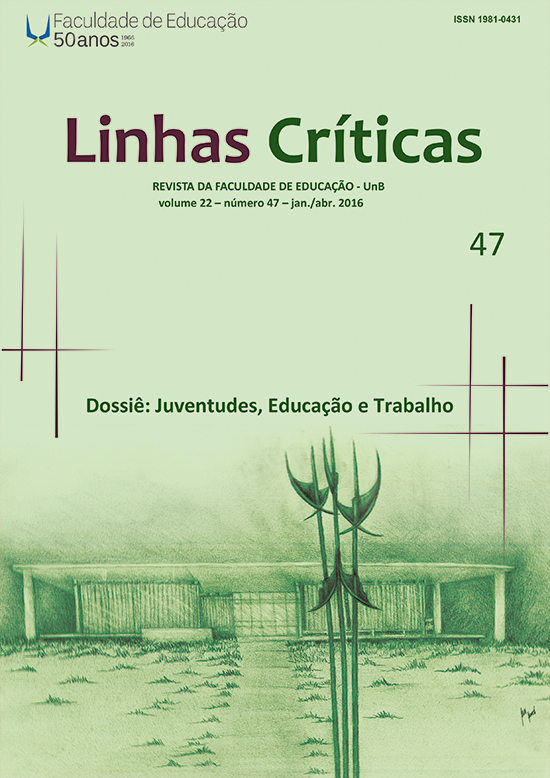Field work for environmental education: geographic theory contributions
DOI:
https://doi.org/10.26512/lc.v22i47.4800Keywords:
Social change, Spatiality, ConstructivismAbstract
The article discusses the relationship between geography and environmental education criticism. Takes field work as a pedagogical method that can promote this approach. Is anchored on the geographical theory of Santos, in Leff, Layrargues and Loureiro in environmental education and Fernandes and Lopes and Pontuschka in field work. This is a joint research and environmental education projects of Federal District's public schools presented at the IV CNIJMA in 2013 are the empirical reference. It analyzes the relationship between environmental education theoretical proposals and projects of schools. It was identified that field work is a good alternative to relate these areas with a focus on social transformation, but is not used in schools.
Downloads
References
CARVALHO, Isabel. Educação ambiental: a formação do sujeito ecológico. São Paulo: Cortez, 2004.
FERNANDES, Maria Lídia Bueno. A prática educativa e o estudo do meio: o conceito de sustentabilidade em questão. São Paulo: Annablume, 2012.
FREIRE, Paulo. Educação como prática da liberdade. Rio de Janeiro: Paz e Terra, 1967.
______. Medo e ousadia: o cotidiano do professor. São Paulo: Paz e Terra, 2011.
LAYRARGUES, Philippe Pomier. Educação ambiental com compromisso social: o desafio da superação das desigualdades. In: LOUREIRO, Carlos Frederico; LAYRARGUES, Philippe Pomier; CASTRO, Ronaldo Souza (Orgs.). Repensar a educação ambiental: um olhar crítico. São Paulo: Cortez, 2009.
LAYRARGUES, Philippe Pomier; LIMA, Gustavo Ferreira da Costa. Mapeando as macrotendências político-pedagógicas da educação ambiental contemporânea no Brasil. In: ENCONTRO “PESQUISA EM EDUCAÇÃO AMBIENTAL”: A PESQUISA EM EDUCAÇÃO AMBIENTAL E A PÓS-GRADUAÇÃO NO BRASIL, 6., 2011, Ribeirão Preto. Anais... Ribeirão Preto: ICMBio, 2011. Disponível em: <http://www.icmbio.gov.br/educacaoambiental/images/stories/biblioteca/educacao_ambiental/Layrargues_e_Lima_-_Mapeando_as_macro-tend%C3%AAncias_da_EA.pdf>. Acesso em: 14 jan. 2015.
LEFF, Enrique. Saber ambiental: sustentabilidade, racionalidade, complexidade e poder. Rio de Janeiro: Vozes, 2012.
LOPES, Claudivan Sanches; PONTUSCHKA, Nídia Nacib. Estudo do meio: teoria e prática. Geografia, Londrina, v. 18, n. 2, p. 173-191, 2009. Disponível em: <http://www.uel.br/revistas/uel/index.php/geografia/>. Acesso em: 15 set. 2014.
LOUREIRO, Carlos Frederico. Problematizando conceitos: contribuição à práxis em educação ambiental. In: LOUREIRO, Carlos Frederico; LAYRARGUES, Philippe Pomier; CASTRO, Ronaldo Souza (Orgs.) Pensamento complexo, dialética e educação ambiental. São Paulo: Cortez, 2006.
SANTOS, Milton. Espaço e Método. São Paulo: Edusp, 2008a.
______. Por uma outra globalização: do pensamento único à consciência universal. Rio de Janeiro: Record, 2008b.
______. A natureza do espaço: técnica e tempo, razão e emoção. São Paulo: Edusp, 2012.
ZABALA, Antoni. Os enfoques didáticos. In: COLL, Cesar et al. (Orgs.). O construtivismo na sala de aula. São Paulo: Ática, 2009.
Downloads
Published
How to Cite
Issue
Section
License
Copyright (c) 2016 Linhas Críticas

This work is licensed under a Creative Commons Attribution 4.0 International License.
Authors who publish in this journal agree to the following terms:
-Authors maintains the copyright and grants the journal the right of first publication, the work being simultaneously licensed under the Creative Commons Attribution License which allows the sharing of the work with recognition of the authorship of the work and initial publication in this journal.
- Authors are authorized to enter into additional contracts separately, for non-exclusive distribution of the version of the work published in this journal (eg publish in institutional repository or as a book chapter), with acknowledgment of authorship and initial publication in this journal.
-Authorers are allowed and encouraged to publish and distribute their work online (eg in institutional repositories or on their personal page) at any point before or during the editorial process, as this can generate productive changes as well as increase the impact and the citation of published work (See The Effect of Free Access).



